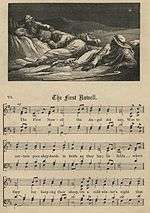The First Nowell
"The First Nowell" (also written "The First Noël" or "The First Noel") is a traditional English Christmas carol with Cornish origins, most likely from the early modern period, although possibly earlier.[2]

"The First Nowell" is of Cornish origin. Its current form was first published in Carols Ancient and Modern (1823) and Gilbert and Sandys Carols (1833), both of which were edited by William Sandys and arranged, edited and with extra lyrics written by Davies Gilbert for Hymns and Carols of God. Nowell is an Early Modern English synonym of "Christmas" from French Noël "the Christmas season", ultimately from Latin natalis [dies] "[day] of birth".[3] The word was regularly used in the burden of carols in the middle ages towards the early modern period; Sir Christèmas (Ritson Manuscript)[4], "Nowell sing we now all and some" (Trinity Carol Roll)[5] and "Nowel - out of youre slepe arise and wake" (Selden Carol Book) being 15th century examples.[6]
The melody is unusual among English folk melodies in that it consists of one musical phrase repeated twice, followed by a refrain which is a variation on that phrase. All three phrases end on the third of the scale. Writing in the Journal of the Folk-Song Society in 1915, Anne Gilchrist notes it was not recorded prior to Sandys' publication. She speculated based on a set of church gallery parts discovered in Westmorland that the tune may have had its origin as a treble part to another carol "Hark, hark the angels sing"; her suggestion was that the treble part was passed down orally and was later remembered as the melody rather than a harmony.[7] A conjectural reconstruction of this earlier version can be found in the New Oxford Book of Carols.[8]
Today, "The First Nowell" is usually performed in a four-part hymn arrangement by the English composer John Stainer, first published in his Carols, New and Old in 1871.[2] Variations of its theme are included in Victor Hely-Hutchinson's Carol Symphony.
Textual comparison
In common with many traditional songs and carols the lyrics vary across books. The versions compared below are taken from the New English Hymnal (1986) (which is the version used in Henry Ramsden Bramley and John Stainer's Carols, New and Old),[1][9] Ralph Dunstan's gallery version in the Cornish Songbook (1929)[10] and Reverend Charles Lewis Hutchins's version in Carols Old and Carols New (1916).[11]
The Annunciation to the shepherds and the Adoration of the shepherds are episodes in the Nativity of Jesus described in the second chapter of the Gospel of Luke (Luke 2). The Star of Bethlehem appears in the story of the Magi (the Wise Men) in the Gospel of Matthew; it does not appear in the story of the shepherds.
| New English Hymnal.[9] | Cornish Songbook.[10] | Carols Old and Carols New.[11] |
|---|---|---|
| 1. The first Nowell the angel did say Was to certain poor shepherds in fields as they lay; |
1. O well, O well, the Angels did say To shepherds there in the fields did lay; |
1. The first Noel, the angels say To Bethlehem's shepherds as they lay. |
| 2. They looked up and saw a star, Shining in the east, beyond them far: |
2. And then there did appear a Star, Whose glory then did shine so far: |
2. The shepherds rose, and saw a star Bright in the East, beyond them far, |
| 3. And by the light of that same star, Three Wise Men came from country far; |
3. And by the light of that same Star, Three Wise Men came from country far; |
3. Now by the light of this bright star Three wise men came from country far; |
| 4. This star drew nigh to the north-west; O'er Bethlehem it took its rest; |
4. The Star went before them unto the North West, And seemed o'er the City of Bethlehem to rest, |
4. Then drawing nigh to the northwest, O'er Bethlehem town it took its rest; |
| 5. Then entered in those Wise Men three, Full reverently upon their knee, |
5. Then enter'd in these Wise Men three, With reverence fall on their knee, |
|
| 6. Then let us all with one accord Sing praises to our heavenly Lord |
6. 'Tween an ox manger and an ass, Our Blest Messiah's place it was; |
References
| Wikisource has original text related to this article: |
- Henry Ramsden Bramley and John Stainer, The First Nowell in Carols New and Old (London: Novello, Ewer & Co., ca 1878).
- The First Nowell, Hymns and Carols of Christmas. "carol of the 16th or 17th century, but possibly dating from as early as the 13th Century." Barrie Jones (ed.), The Hutchinson Concise Dictionary of Music, Routledge, 2014, s.v. "carol", "Christmas carols were common as early as the 15th century. [...] Many carols, such as 'God Rest You Merry Gentlemen' and 'The First Nowell', date from the 16th century or earlier."
- "Noel". Eytmonline: Online Etymology Dictionary. Retrieved 29 December 2011.
- British Library, Add.5665, in Edith Rickert, Ancient English Christmas Carols: 1400-1700 (London: Chatto & Windus, 1914), p. 218
- The James Catalogue Of Western Manuscripts O.3.58, Trinity College Library, Cambridge 2014
- Selden MS, B.26 f.14v. in Edith Rickert, Ancient English Christmas Carols: 1400-1700 (London: Chatto & Windus, 1914), pp. 165-6.
- Annie G. Gilchrist, "Note on the Carol "The First Nowell" Journal of the Folk-Song Society 519 (June 1915), pp. 240-242. JSTOR 4434017
- Keytes and Parrott, New Oxford Book of Carols (Oxford University Press, 1992) ISBN 0-19-353323-5.
- New English Hymnal, (Canterbury Press, 1986), No. 36.
- Ralph Dunstan, The Cornish Song Book (London: Reid Bros., Ltd., 1929), pp. 126.
- Rev. Charles Lewis Hutchins, Carols Old and Carols New (Boston: Parish Choir, 1916), No. 643.